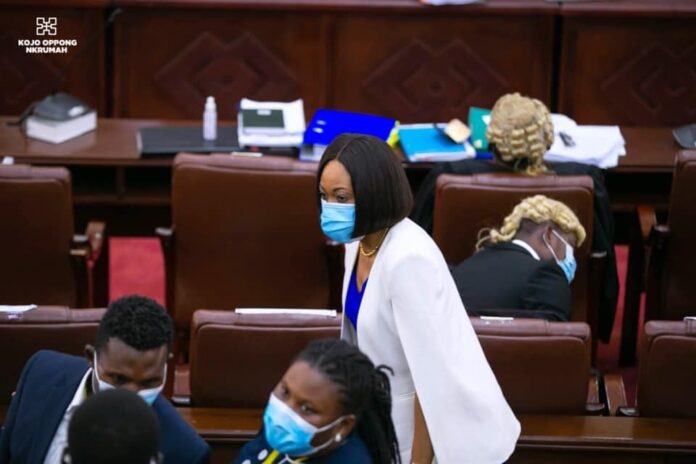
The seven-member panel of the Supreme Court has ruled that the Chairperson of the Electoral Commission, Jean Mensa is free not to testify in the ongoing election petition.
The two respondents on Tuesday made the application to the apex court arguing among other reasons that the petitioner had not sufficiently discharged on his obligation to prove the issues raised for determination.
The ruling follows three hours of legal arguments on Tuesday between lawyers for the respondents, Justin Amenuvor and Akoto Ampaw, and the petitioner’s lawyer Tsatsu Tsikata.
The unanimous ruling of the apex court panel of seven chaired by Chief Justice Kwasi Anin Yeboah was that the rules of the Court do not require it to compel the respondent’s witnesses to give evidence when they have waived that rights.
According to the court, the inherent jurisdiction of the court does not require the justices to extend their jurisdiction beyond what the lawyer requires.
The panel which also includes Justice Yaw Appau, Justice Samuel Marful-Sau, Justice Prof Nii Ashie Kotey, Justice Nene Amegartcher. Justice Mariama Owusu and Justice Gertrude Torkornoo rule that, they are not convinced with the invitation from the Petitioner to compel the respondents’ witness in the petition to mount the box.
The application from the respondent was therefore upheld.
Subpoena
Following the ruling of the court, the lead lawyer for the Petitioner Mr Tsatsu Tsika has indicated that they seek to leave of the court to re-open their case to have a subpoena serve on the EC Chairperson to mount the box.
He said they intend to file a formal motion to that effect.
The panel is on a short break and will return to give further orders.
Legal submissions
On Tuesday, February 9, the apex court welcomed legal arguments from the parties on whether or not Mrs Mensa should testify, lawyers for the parties (Mr Mahama, the EC and President Akufo-Addo) made their respective arguments.
They touched on the rules of court relating to witnesses, case laws on the rights of parties to call or not to call witnesses to adduce evidence, vis-a-vis the court’s power to intervene in the exercise of those rights.
Respondents arguments
Lawyers for the respondents, Mr Justin Amenuvor (the EC) and Mr Akoto Ampaw (President Akufo-Addo) both took the view that the rules of court, specifically the High Court (Civil Procedure) Rules, 2004 (C.I. 47), and its subsequent amendment, C.I. 87, supported their decision not to call any witness.
Akoto Ampaw, the lawyer for Akufo Addo, 2nd Respondent added that, if the Petitioner has a good case, he should be happy that the respondents have decided not to give evidence
Tsatsu disagreement
Mr Tsikata, Lead Counsel for the petitioner opposed to the submission, made by the respondents to the effect that, the respondents’ position was not in compliance with any rule of court, including CI:99, the rules governing presidential election petitions.
According to him, it was in the best interest of justice for the EC Chairperson to be cross-examined adding that Mrs Jean Mensa was responsible for the declaration of the presidential results and that had the responsibility to account to the people of Ghana
Mr Tsikata argued that the EC chairperson must be in the box because she had deposed to a witness statement and also made certain assertions in her affidavits which presupposes that she was offering herself to be cross-examined
It was the further case of Mr Tsikata that the EC opposed to the petitioner’s application for interrogatories with the explanations that those interrogatories could be asked during cross-examination.
The chairperson he said has elected to be cross-examined and had long crossed the bridge where they can say she does not want to mount the box.
Mr Tsikata indicated that, should they withdraw the Witness Statement, there is an option of subpoena where the court can compel her to be cross-examined.
More soon…

